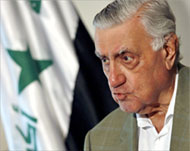Iraq Shia bloc to vote on Jaafari
Iraq’s Shia Alliance has said it will hold an internal vote to name a prime minister, raising the possibility that Ibrahim al-Jaafari will be removed to end a months-long impasse over a unity government.

The alliance announced the move on Thursday after al-Jaafari, who had ignored calls from Sunni Arabs, Kurds and some Shia to step aside, invited it to decide whether he should resign.
Al-Jaafari reiterated in a televised speech on Thursday that it was up to his Shia bloc to decide his fate.
“I left the choice with them (the alliance), to do whatever they want,” al-Jaafari said.
His 20-minute speech stopped short of saying he was ready to resign to break the deadlock.
Hussain al-Shahristani, an alliance member, earlier told a news conference that “the general chamber in the alliance will vote on this issue as it did previously. That will be soon”.
Jaafari’s refusal to step down as the alliance’s nominee for prime minister has paralysed the US-backed political process.
Washington is increasingly frustrated at the inability of Iraqi leaders to put together a government made up of Shia, Sunni Arabs and Kurds, seen as the best hope to tame a Sunni insurgency, halt sectarian bloodshed and avert civil war.
Parliament postponed
Failure to agree how to share government posts prompted legislators to postpone Thursday’s scheduled meeting of parliament until Saturday – the second such delay in a week.
 |
|
Adnan Pachachi said there were |
The alliance, the largest bloc in parliament, chose Jaafari by a one-vote margin in an internal ballot in February. The vote exposed splits in the grouping that won December elections.
Critics says Jaafari is a weak leader who has failed to curb violence and improve the economy in his year in office.
Ali al-Adeeb, a member of Jaafari’s Dawa party, is one name floated by the alliance to replace the incumbent premier.
Earlier on Thursday, an alliance official read out a statement quoting Jaafari as saying his fate rests with those who picked him.
“You have chosen me and I return back this choice to you to decide what you see appropriate,” Jawad al-Maliki, an official from Jaafari’s party, quoted him as saying.
“You’ll find me totally prepared to accept your decision for the sake of the unity of the alliance.”
Unresolved issues
Adnan Pachachi, the acting parliament speaker, delayed the assembly session to April 22 to give blocs more time to agree on key posts.
Parliament has sat only once since it was elected.
“Leaders of political parties have agreed to postpone parliament. There are still some issues that have not been resolved yet,” Pachachi told a news conference.
Alliance legislators had threatened to boycott the sitting, saying they would only attend if all parties agreed beforehand on top posts, including that of assembly speaker.
Signalling growing impatience at the delay, George Bush, the US president, said on Wednesday that “the political process in Iraq must occur soon and we are working toward that end”.
But ditching Jaafari could split the Alliance, whose electoral victory reversed decades of Sunni Arab domination under Saddam Hussein and previous administrations.
Jaafari had won the ticket thanks to the support of Muqtada al-Sadr, a young anti-US cleric with growing political clout.
The deadlock over forming a national unity government has coincided with a surge in violence that has pushed Iraq to the brink of civil war three years after US-led forces invaded.